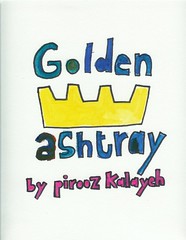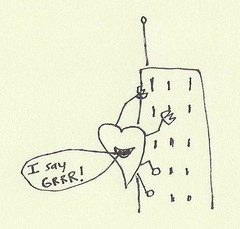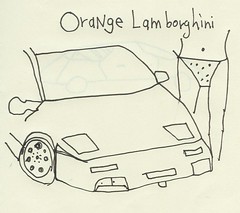 Pirooz: Yesterday you said that Gus Van Sant could have taken LAST DAYS and ELEPHANT as far as he took JERRY, but that he had stopped short of the possibility. I am fascinated by that statement. In it, I hear a director dancing with an idea. How do you plan on utilizing Van Sant's real-time-moments on your current or future projects? Why is this sense of "husking corn for 15 minutes" so appealing to you?
Pirooz: Yesterday you said that Gus Van Sant could have taken LAST DAYS and ELEPHANT as far as he took JERRY, but that he had stopped short of the possibility. I am fascinated by that statement. In it, I hear a director dancing with an idea. How do you plan on utilizing Van Sant's real-time-moments on your current or future projects? Why is this sense of "husking corn for 15 minutes" so appealing to you?Derek Huang: Well, right now, I'm at the point in my life where I'm still trying to build something resembling a career, and I suppose I don't feel like I've earned the right or acquired the skills necessary to make those types of films. Instead, I find myself attempting to cater to the needs of a more traditional audience, trying to prove that I can meet most other people's needs before my own.
In film school, I experimented with my shorts, single-mindedly focusing on a single, stylistic, visual strategy for each student project, almost always to the point of error. I probably obsessed a little too much on the scientific connotations of each artistic experiment, making the resulting films perhaps a little too controlled, a little too specifically regulated to successfully function as art. They simply weren't whole works. I mean, they were completed from start to finish, but they were never fully realized or well rounded enough to evoke and encapsulate human experience. They were simply exercises pursued for the sake of personal curiosity and obsession.
Now that I'm out of school, I've taken a less methodical approach to my filmmaking, and though I find myself consciously attempting to make films that deliver on more conventional terms, I can't seem to prevent myself (for worse or better) from at least partially utilizing this more meditative mode of filmmaking that you've brought up. Right now, I'm working on a short, and though it's fairly conventional in its overall structure, the beginning of the film, with the introduction of the protagonist to the audience, has developed into a stark meditation on the mundane daily activities of one man's life. The first quarter of the film almost solely consists of this character coming home from work, putting away clothes that lie on the bed, heating a can of soup, eating his dinner by himself, and staring at spiders in the corners of the ceiling. These are all very mundane things, and yet, to turn the camera on them and portray them as honestly and as directly as one possibly can -- you've found a different way of evoking the texture of life.
Some might argue a filmmaker is being lazy when using this method, aiming the lens at a reality that's already there and calling it art, but it simply isn't that easy. There's an extremely delicate visual grace required in filmmaking to capture the mundane in a compelling way. To enumerate the factors that contribute to achieving that grace successfully would be self defeating because anything that could be succinctly enumerated without being witnessed first hand would automatically be disqualified as a contributing factor. If I can say what IT is, then IT is not achieved in the film using this meditative technique. When this stylistic technique is utilized successfully, the film's literal and figurative content, though plain, mundane, and perhaps even nonexistent at times, fade to the background, and all the subtle textures of the film's form reveal a beauty in life that can't be arrived at through traditional narrative means.
I loved the use of this technique in Gerry, more so than in Last Days or Elephant. And to tell you the truth, I'm not really sure why. I suppose it has something to do with the mise en scene of the latter two films. I found it a little too conventionally orchestrated. At times, those films seemed a little too preoccupied with functioning on a more conventional narrative level. Yes, in regards to form, the camera's eye is used in similar ways, but it feels superficially tied to the content. The characters and situations are a little too concrete and simplified (though by conventional standards, not concrete or condensed at all) to evoke that elusive third meaning.
In films like these, the mise en scene must hold up to absolute scrutiny. Any abstraction or distillation for the sake of brevity or convenience undercuts its effectiveness. Gerry is the only film of Van Sant's "trilogy" that takes its stylistic intentions far enough to achieve its goals. A film like that doesn't hide behind the sparks and fireworks of a conventional narrative. It comfortably disregards those manipulative strategies and effortlessly renders the truth and texture of life. Isn't that the fundamental goal for which all artists strive? To render as accurately as possible that ephemeral yet extremely familiar quality of being? I'm sorry. I'm starting to get a little too general and abstract. I think I need another question. Hit me.
P: I hear you. Enumerating on the IT factor of capturing the mundane spider will be a self-defeating act. I am also curious. What does that feel like in film? How do you know when you are capturing that wholeness of the mundane, without mapping certain aesthetic elements to navigate? Don’t you start thinking about lighting? An actor’s expression? The quality of the film being used? Isn't it a blend between the technological and magical? Doesn't every artist poet, painter, filmmaker, actor, dancer, etc., use tools and logical process in unison with instinctual triggers?
Huang: You should probably be asking a master filmmaker that question, because I am in no position to explain such things. But that doesn't mean I can't try, right? I suppose, for me it's all a matter of inspiration: ideas, images, and forms that simply occur to an artist and then can be placed in the larger context of a complete work.

How do I know the shot of the mundane spider in my short will work? Well, first off, I'm not sure it'll work at all. Remember, I'm still an untested novice. That being said, I wouldn't have though of putting it in my film if I didn't have my reasons for thinking it would somehow evoke something necessary to the overall film. My justification for inserting that spider element into the film comes from the plain and simple fact that it naturally occurred to me to put it in there.
The creative method I've come up with for myself is, at it's essence, my watching my own film as I create them. I suppose you could call it pre-visualization but with both a passive and an active functionality where I imagine myself sitting in a theatre watching a movie as I put it together in my mind. If I come up with an idea, I project it up on my imaginary screen and watch it, judging it as I would any other film. If I find that it makes sense, that it evokes a specific emotion, that it holds my attention or intrigues me, I keep it and do all I can to commit it to celluloid. I know this sounds overly simplistic, but it's the only way I can describe my creative process for filmmaking. And it's not easy. Judging from my own personal experience, it's a lot harder to do in practice than it sounds.
Although, it may be, at its heart, a mental state that we are all innately born with as children, the process of being socialized into adult life can stifle these natural, imaginative states, which is why I think most young artists become obsessed with technique and method, to the point where they lose sight of the inspired thoughts that are the foundation of any artistic pursuit. Technology and craft, I feel, should, for the most part, serve inspiration. I think all art is born spontaneously as fragments that linger in the mind, and technique serves to organize these fragments into a focused communication while at the same time translating them into a real-world medium that can be appreciated by others, the end result being the piece of art itself.
The specific thought of a lonely man watching a spider occurred to me. I placed it in my film and viewed it in my minds eye. I enjoyed it in the same way I enjoy any successful part of a film I've ever seen, even if I can't necessarily explain why. And now it's time to use all the concrete knowledge I have of filmmaking technology (lighting, camera placement, camera movement, sound, performance, editing, etc.) and translate the vision in my head, which already thoroughly indicates numerous objectives for each aspect of the craft, to an actual motion picture that I play for you on the screen. So much of what makes art beautiful lies in that inexplicable flash of inspiration that occurs in the mind, and while technique is vital and requires much study and practice, it will always be secondary to those mysterious moments of inspiration that, for whatever reason, indicate the most fundamental elements of our shared humanity.
 Derek Huang was born and raised in Santa Clarita, CA. He studied film production at the UCLA School of Film and Television and is currently pursuing a film career in Los Angeles.
Derek Huang was born and raised in Santa Clarita, CA. He studied film production at the UCLA School of Film and Television and is currently pursuing a film career in Los Angeles.












4 comments:
Thank you for conducting this interview, Pirooz.
Derek's perspective on film as an art form is, in itself, an art form.
Another great interview, Pirooz. Makes me wanna go rent Gerry again and give it another chance. But that's also the beauty of film and artistic vision in general - I can certainly choose to enjoy what I want to enjoy and not have to feel like "I don't get it." I'm putting that out there - I didn't get Gerry the first time I saw it. Maybe the next time I will. Maybe I won't...
i love Derek Wonder Twin Power. Best of the bunch.
G--You're up next!
J--Glad you dug it. Maybe, we can watch Gerry (Jerry?) sometime soon...
You know outside this interview, Derek put my choice to do interviews to inquiry. I really loved that. It gave me an opportunity to be clear about why I include them on the blog, and why Derek's questioning mind is such a thrill to be around, even when he is buzzingly silent.
You see, the truth is, interviews are a creative act. We have this wonderful opportunity to collect the gems of perspective/genius that all people inhabit. It may be about a beautiful spider. It may be about comedy or drugs. It may even be about ballet dancers. All in all, they inform the interviewer, personally, and then extend outward into our community, guiding, inspiring, raging, you name it.
Thank you, Derek, and all those I have and will interview.
Post a Comment